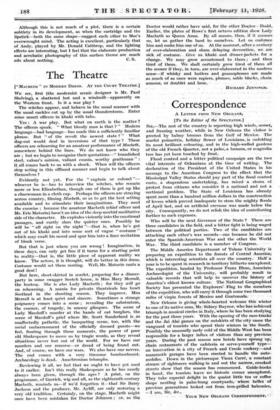The Theatre
["MACBETH " IN MODERN DRESS. AT THE COURT THEATRE.]
WE see, first (the modernist scenic designer is Mr. Paul Shelving), a shattered but and a windmill—apparently on the Western front. Is it a war play ?
The witches appear, and behave in the usual manner with the usual cackles cut up by the usual thunderstorm. Enter some smart officers in khaki with tabs.
Yes : A war play. But what on earth is the matter-? The officers speak. " What bloody man is that ? " Modern language7-bad language—has made this a sufficiently familiar phrase. But " of the revolt the newest state ? " What dug-out would deal in inversions of that type ? These officers are rehearsing for an amateur performance of Macbeth, somewhere behind the lines. We do not know who they are ; but we begin to recognize their quotations—" brandished steel, valour's minion, valiant cousin, worthy gentleman " : it all comes back to us with a shock. When will the officers stop acting in this offhand manner and begin to talk about themselves ?
Evidently not yet. For the " captain or colonel "- whoever he is--has to interview the witches, who remain more or less Elizabethan, though one of them is got up like a charwoman in a cloth cap. Perhaps the officers are straying across country, filming Macbeth, so as to get the best setting available and to stimulate their imaginations. They need the exercise ; because the amateur Macbeth (chief officer and Mr. Eric Maturin) hasn't an idea of the deep morbid meditative side of the character. He explodes violently into the emotional passages, and curtly slurs the quieter ones. Possibly he will be " all right on the night "—that is, when he's got out of his khaki and into some sort of vague " costume " which may exalt his mood and spur him into a finer recitation of blank verse.
But that is just where you are wrong ! Imagination, in these days, can only get free if it turns for a starting point to reality—that is, the little piece of apparent reality we know. The actors, it is thought, will do better in this dress: Costume would set them ranting. Well, Mr. Maturin rants a good deal I
But here, short-skirted in scarlet, preparing for a dinner- party in some swagger Scotch house, is Miss Mary Merrall, the hostess. She is also Lady Macbeth ; for they will go on rehearsing. A mania for private theatricals has beset Scotland in the shooting season.. They improve. Miss Merrall is at least quiet and sincere. Sometimes a strange poignancy comes into a scene ; revealing the substratum, the essence, of tragedy, in uneasy glimpses. The scene of Lady Macdufrs murder at the hands of cat burglars, the scene of Macduff's grief where Mr. Scott Sunderland is ,:so unaffectedly pathetic, the banqueting scene, too, with the social embarrassment of the officially dressed guests—we feel, floating through those moments, the power of poor
old Shakespeare to move -us by tragic words, as they reveal situations never lost out of the world. For we have our
murders and, our remorse—or dread of being found out And, of course, we have our wars. We also have our nerves. The end comes with a very tiresome bombardment. Archaeology is dead. Anachronism triumphs.
Reviewing it all, we feel that we ought to have got used to it earlier. Isn't this really Shakespeare as he has nearly always been given, through .the ages ? A print, on the programme, of Garrick, wig and all, as the eighteenth-century Macbeth, reminds us—if we'd forgotten it—that Sir Barry Jackson and the producer, Mr. Ayliff, are only restoring a very old tradition: Certainly, on the stage, Macbeth might once have been mistaken for Doctor Johnson ; or, as the
Doctor would rather have said, for the other Doctor—Dodd. Earlier, the plates of Rowe's first octavo edition show Lady MaCbeth as Queen Anne. By all means, then, if it amuses us, let us gather the bard to ourselves. Let us embrace him and make him one of us. At the moment, after a century of over-elaboration and sham delaying decoration, we are sick of costume. Give us khaki. and dinner-jackets for a change. We may grow accustomed to Ahem- ; and then tired of them. We shall certainly grow tired of them all the sooner if they, in turn, are over-elaborated in the modern sense=if whisky and butlers and gramophones are made as much of as once were rapiers, plumes, sable blacks, chain armour, or doublet and hose.
- RICHARD JENNINGS.






































 Previous page
Previous page